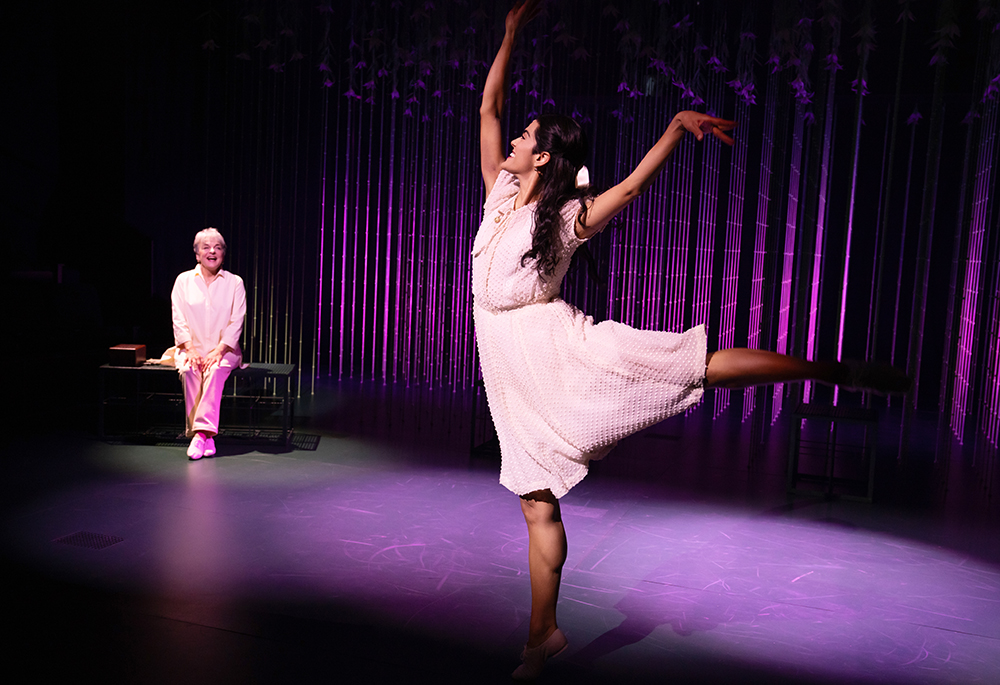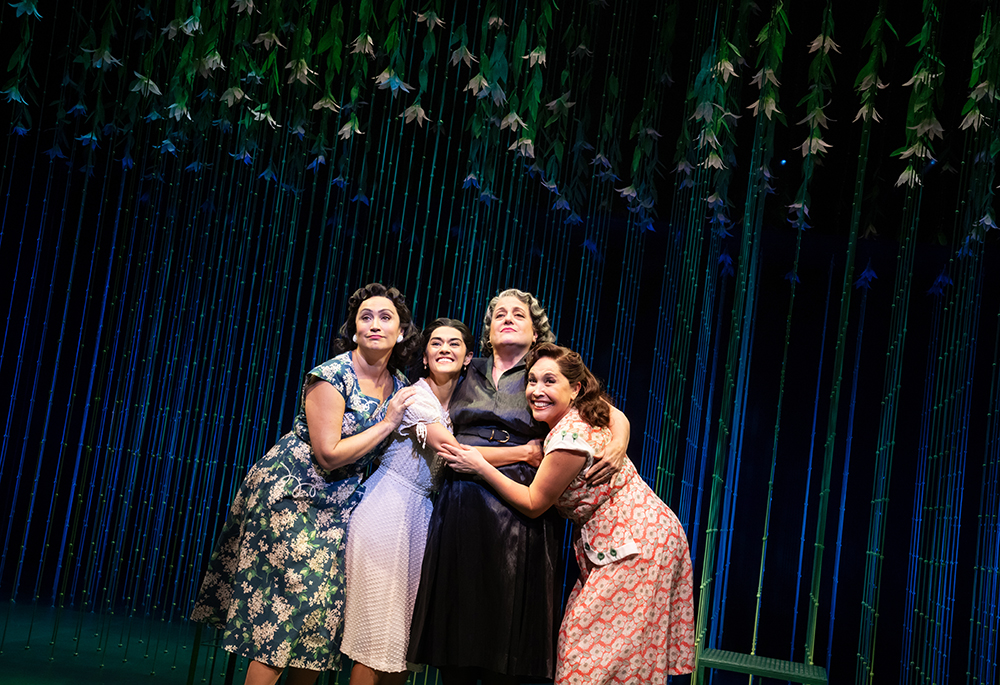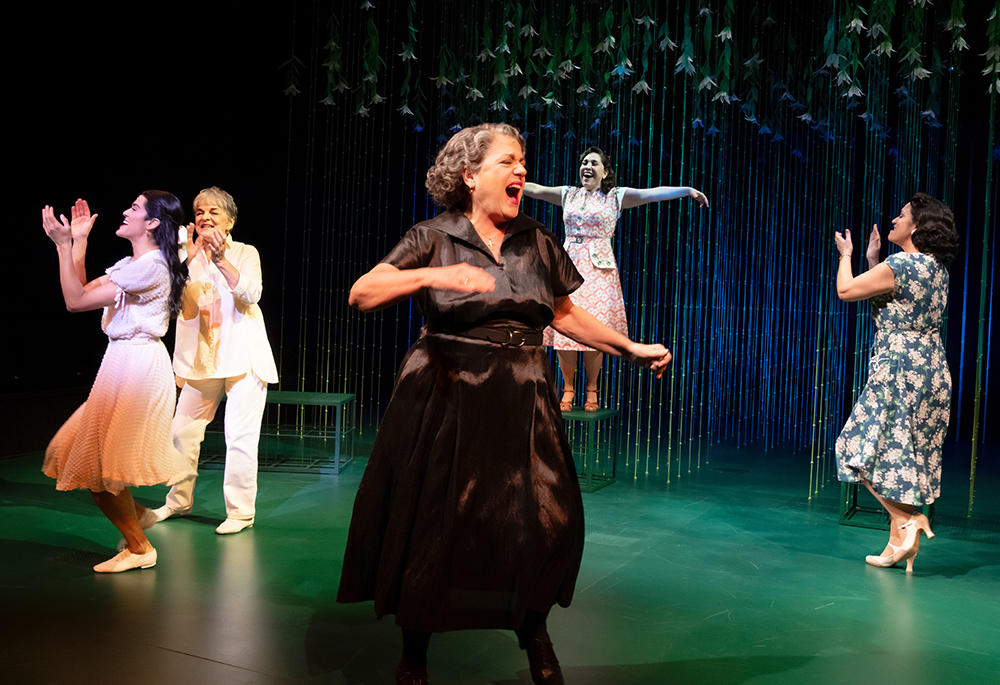
Priscilla Lopez and Kalyn West perform as Older and Younger Anuncia in "The Gardens of Anuncia." (Courtesy of Lincoln Center for the Performing Arts/Julieta Cervantes)
When Graciela Daniele was 6 years old, a doctor diagnosed her as having a problem with her arches. But rather than wear special shoes or have surgery, he suggested a most unusual prescription: "Why doesn't she take ballet?"
The dance studio to which she went "was a big room with mirrors at both ends," she told the Lincoln Center Review. "By looking into one mirror you saw the other mirror and back and forth, like [in] Through the Looking Glass. The space went on forever." It was riveting to her: "I wanted to run through that infinite space."
In many senses, she has.
As a young woman, Daniele would leave her home in Buenos Aires to dance all over the world. Eventually she settled in New York, where she worked with renowned choreographers like Merce Cunningham, Michael Bennett and Bob Fosse, who made her his dance captain on the groundbreaking "Chicago." Daniele went on to become choreographer and director for numerous shows on and off Broadway. In 2021 the American Theatre Wing conferred on her a Special Tony Award for Lifetime Achievement in the Theatre.
While serving as director-in-residence at New York's Lincoln Center, Daniele was paired on a show with Michael John LaChiusa, an up-and-coming musical theater composer. The two became fast friends, and over the last 30 years have collaborated frequently. This fall, the two opened a new show about Daniele's upbringing in Buenos Aires: "The Gardens of Anuncia."

Eden Espinosa, Kalyn West, Mary Testa and Andréa Burns perform in "The Gardens of Anuncia." (Courtesy of Lincoln Center for the Performing Arts/Julieta Cervantes)
For LaChiusa, who, like Daniele, was raised Catholic, renaming the Daniele character "Anuncia" is immensely significant. "I love the feast of the Annunciation," he told Lincoln Center Review. "The Annunciation is the story about how the angel Gabriel comes to Mary and asks her if she would be willing to carry the son of God."
In the show, Anuncia is a teenager in Buenos Aires, being raised by her mother, grandmother and aunt during the Perón dictatorship. Over the course of the show, Anuncia has to decide what to do with the gifts she's been given; how to respond to the invitation that they present.
"If you are given a gift, say, the gift of dance or painting, do you accept it and bear all the responsibilities of having that gift?" LaChiusa wonders. "Or do you refuse it and deal with those consequences?"
Reflecting on those momentous times in her life, an older version of Anuncia, who serves as the story’s narrator, reflects on the story of the Annunciation: "God doesn't just make Mary pregnant," she tells the audience. "He asks her. And she gets to decide: Will she become the mother of Jesus and bear all the sorrow that goes with being his mother, or will she say no?"

Actors perform in "The Gardens of Anuncia"; "I love the feast of the Annunciation," composer Michael John Lachiusa told Lincoln Center Review. "The Annunciation is the story about how the angel Gabriel comes to Mary and asks her if she would be willing to carry the son of God." (Courtesy of Lincoln Center for the Performing Arts/Julieta Cervantes)
Soon after, the three women of Anuncia's life sing a gorgeous Annunciation hymn written by LaChiusa. And, once again, the emphasis is on not the wondrous opportunity or burden that she's been offered, but on the fact that God gives her the freedom to choose: "The whole world waited for the maiden's yes," begins Anuncia's Tía. "And what she’d answer was anyone's guess." The song concludes even more strongly: "Though she was chosen, Mary still was free/ She could do as God asked or say, 'Not me.' "
This is not the way that the Annunciation is usually framed. The Annunciation, we're told, is the story of Mary saying yes, of her taking this astonishing leap of faith. Gabriel's words in the Gospel of Luke are not even framed as a question. "Behold, you will conceive in your womb and bear a son," he begins, before telling her exactly what she is to name the child and whom he shall be. Mary asks but one question, an eminently practical one — "How can this be?" — before she agrees.
Advertisement
But of course LaChiusa is correct, God gave Mary the freedom to choose. Mary's yes means nothing if she didn't have the freedom to also say no. "Gardens" invites us to slow the story down so that we can see and explore that moment between announcement and decision.
Within the context of the play, that hesitation opens a space for a beautiful meditation on the whole of Anuncia's (and Graciela Daniele's) life. The play is, in a sense, an act of grateful remembrance of the three women who are so essential to who Daniele is, each of whom had their own moments of Annunciation, their own choices to consider and then make.
'Mary's yes means nothing if she didn't have the freedom to also say no.'
If we allow the Annunciation of Mary a similar spaciousness, what can we discover? One thing, certainly, is the extraordinary respect that God has for us. God clearly had a path in mind for Mary — you don't roll out the angels for just anything. And God truly needs her. But God does not force this young woman to agree, despite just how important she is. "If she says no, that would mean that God wouldn't be able to take human form and live among men," the older Anuncia muses in the play. Even under such extraordinary conditions, our free will is allowed to be paramount.
In this season of Advent and Christmas, we celebrate Mary's willingness to say yes to God — as we should. But as noted by the women of "The Gardens of Anuncia," there's something else to be celebrated, too: God allowed her the freedom to also say no. God gave Mary, and gives us, that "infinite space" of freedom to choose the course of our lives for ourselves.







